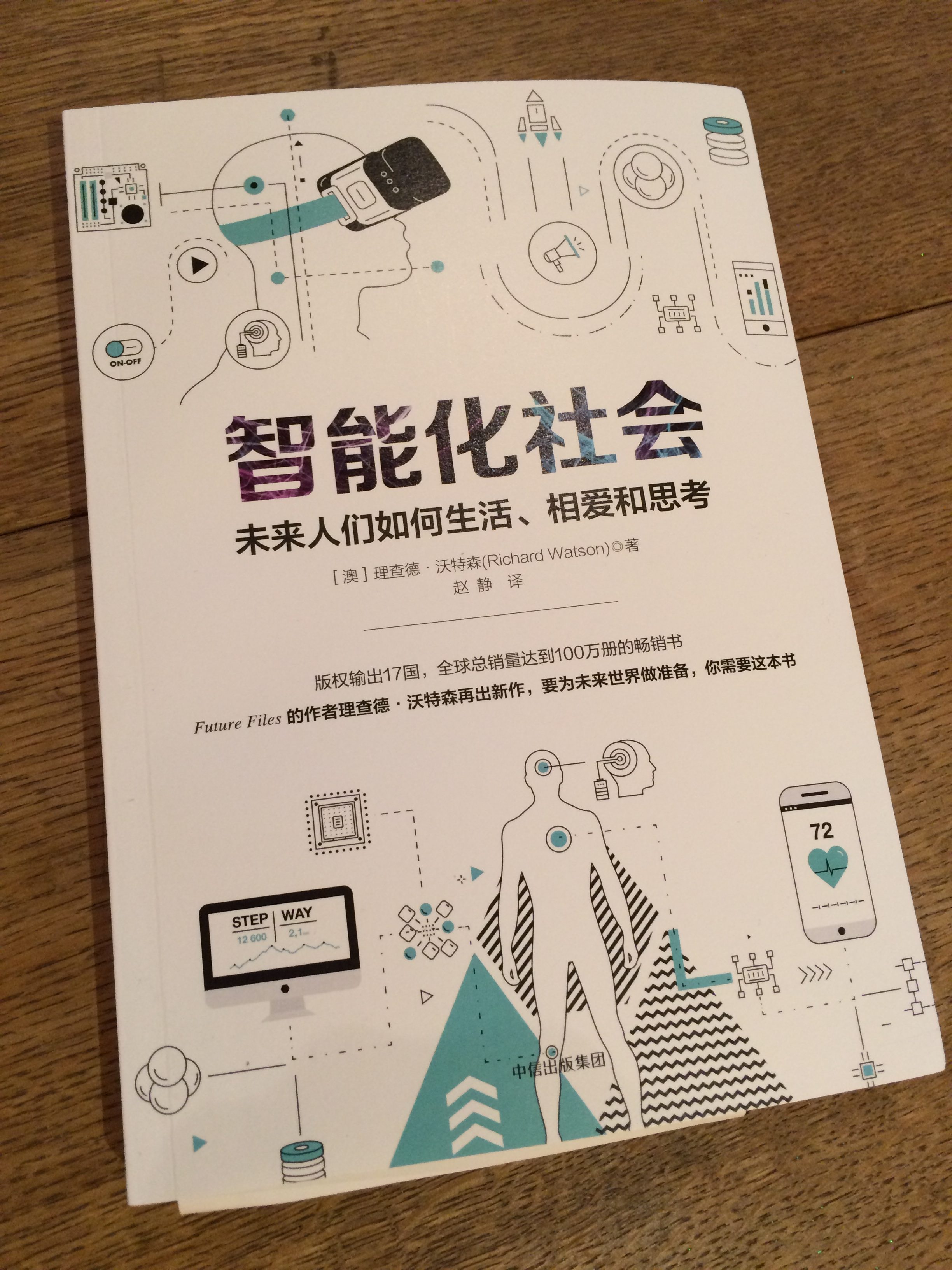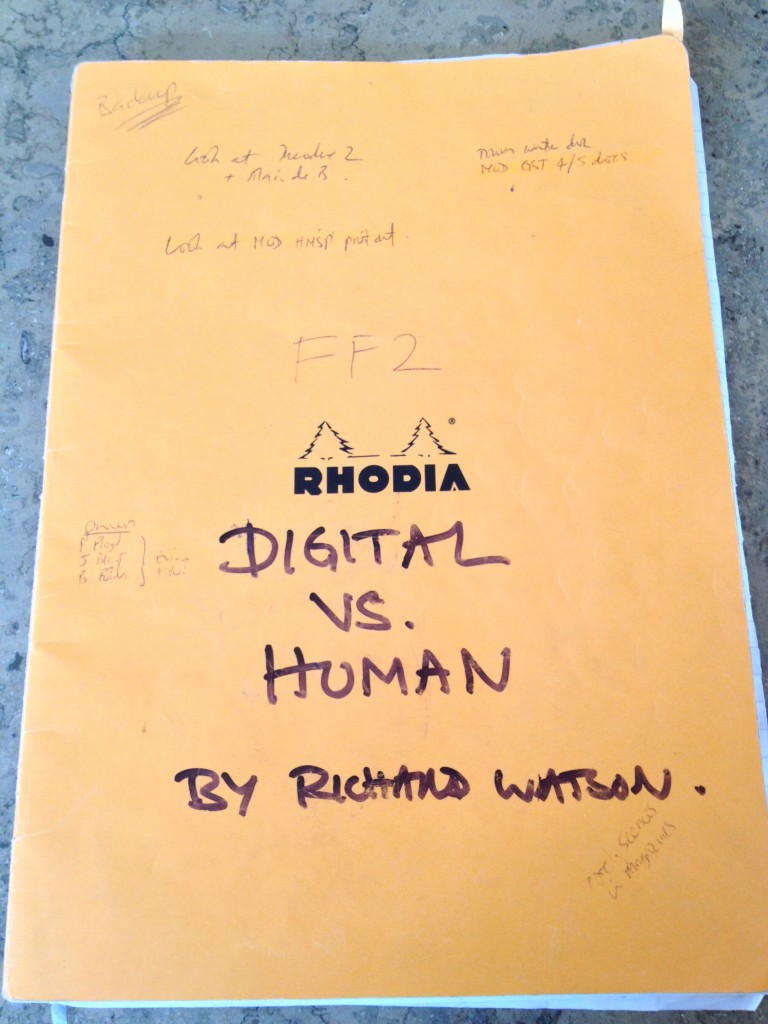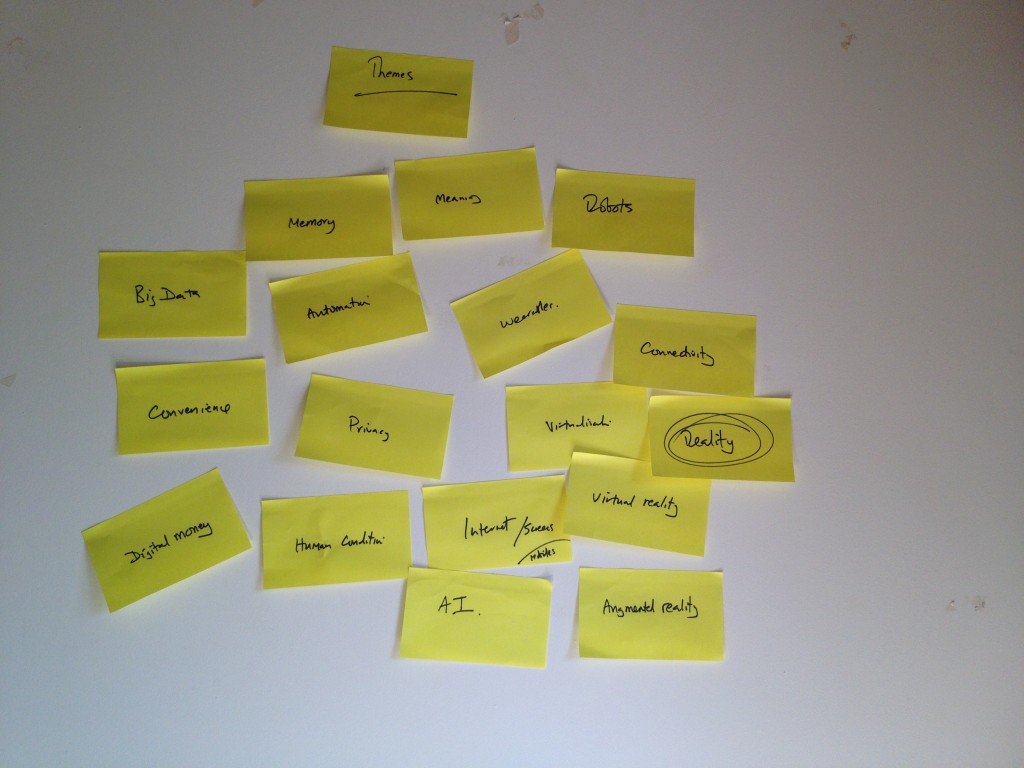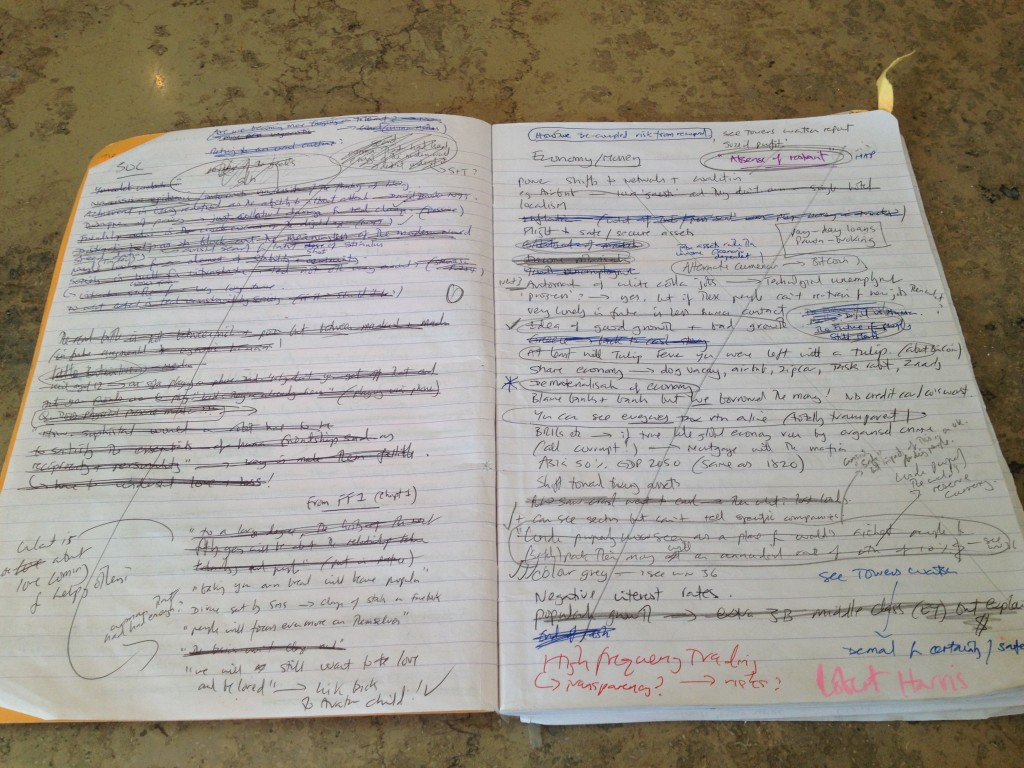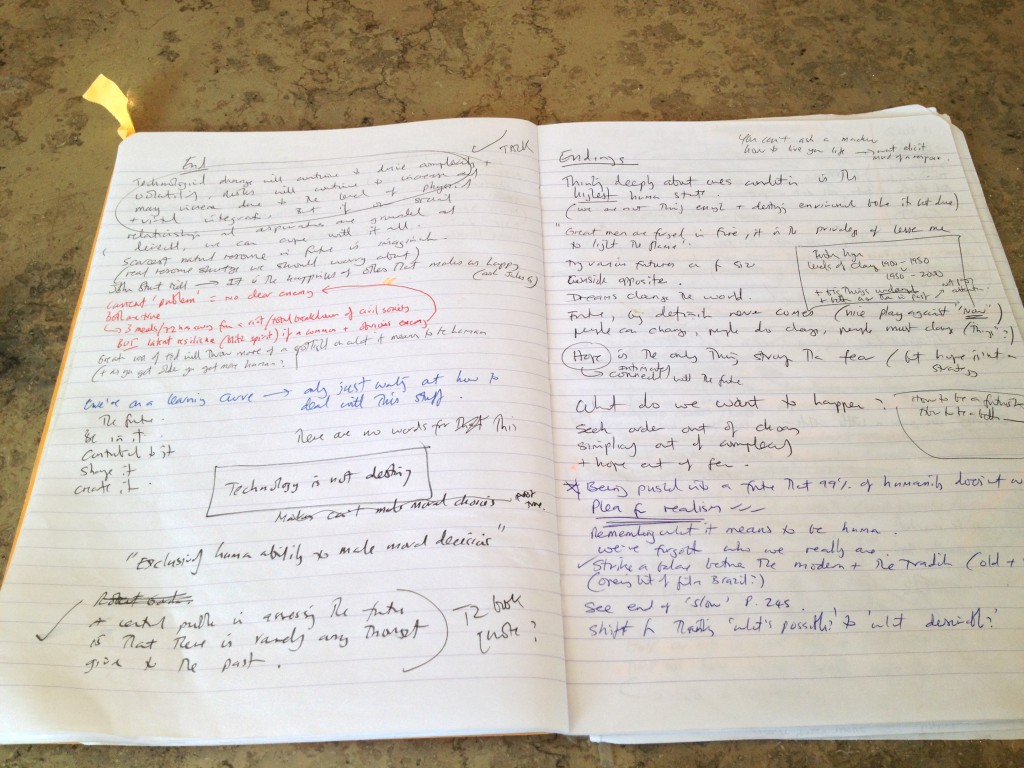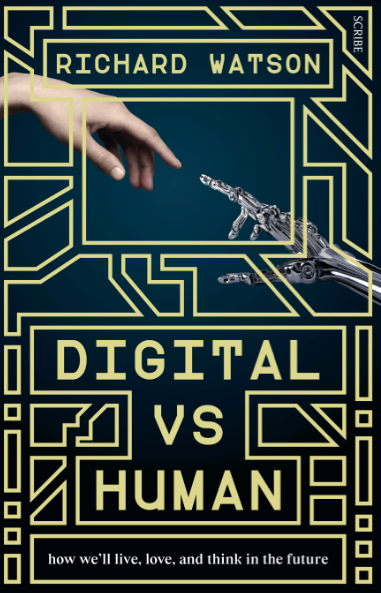The only country, I believe, that’s translated every single one of my books is China.
Category Archives: Digital Vs. Human (development)
How Digital Vs. Human was written
If anyone is wondering how a book gets put together here’s how I did it. Firstly, I didn’t start with a title. In fact for the first 6-months this book was simply called ‘FF2’ (Future Files 2) and later More or Less Human. Eventually a number of key themes started to emerge, notably screens, the internet, phones, automation, robots and AI and eventually the final title (Digital v Human).
As you can see I had an A4 yellow notebook that held all my ideas (not backed up!!!) and eventually I had the key thoughts for each of the chapters once the chapter list was sorted out. The chapter names took forever, but I think they work really well.
So that’s it really. It started in September 2014 and was done by January 2016.
Free chapter downloads and online ordering links here.
Digital vs. Human – who has the upper hand?
Here, at last, is the cover for my new book Digital vs. Human. The debate we’ve been having is who has the upper hand – the humans or the machines? Actually that’s a little unfair as one of the key points I make is that the future must be Digital and Human, not Digital or human, but the debate is still a pertinent one. In an ideal world I would have had the robot hand top left, as this suggests that it’s the machines that are in control, which is nicely provocative. As it is it’s the human hand, or perhaps the hand of God, that seems to be in charge, although the human hand does look rather unsure of itself, which is also really good.
Digital vs Human – early testimonials
Here are the first testimonials for my new book Digital vs Human.We are in the process of editing these down so they can be used on the cover, which I’ll be sharing with you shortly.
“A highly readable, witty and wise book, richly informative, sharply critical but balanced, an excellent investigation of the achievements and predictions of digital technology.”
Theodore Zeldin, author of The Hidden Pleasures of Life
“The issues he addresses are pertinent, the questions he asks are incisive, and the ideas he assembles are tantalising.”
Dr Jules Goddard, Fellow, London Business School
“In a culture obsessed with the kind of skills and performance that could turn the next generation into second-rate automata, Watson readjusts the focus to what really counts: feelings and relationships of all kinds. He presents a truly persuasive case for his claim that: ‘It’s not the internet that should be at the heart of things, but the human heart”.
Professor Susan Greenfield, author of Mind Change
“A remarkable and important book, which examines our possible futures with great humanity and a clear eye. Everyone should read it.”
Lavie Tidhar, author of A Man Lies Dreaming
“Richard Watson doesn’t write like your average futurist. He’s interested in people, not machines, and so his analysis of the way our world is changing has a very human and accessible quality. Most futurists seek to sell you a vision of the future, but Richard’s there to help show you the way.”
Antony Funnell, presenter of ABC Radio National Future Tense
Digital vs Human (final fiddle)
Back page text
It’s hard to believe, but the book goes on. Days away from printing now, but still trying to get the cover right and also re-writing the back cover text at the last minute. The key thing here is obviously to convey what the book is about for people that haven’t read it (and one supposes don’t have more than about ten seconds to do so before they move on to another book). The current words are below, with the first pass below that. The key point, for me at least, is not that the book is about digital systems, robotics or artificial intelligence, but the looming battle between human and digital minds. More specifically, it’s about what a small group of people is arguably imposing on the rest of the human race. This has shades of the 1% (or the 99%), but also the banking crisis. This is an observation that’s been picked up by one of my favourite columnists at the Financial Times, Gillian Tett. Prior to 2007/8 banking was run by a tiny group of people and nobody else really understood what they were doing. IT at the cutting edge is much the same. It’s a small group of experts and almost nobody else has a clue about what they are doing or what the longer-term consequences might be.
Current re-write.
From the author of the international bestseller Future Files comes the one book you need to prepare for tomorrow.
Life has never been better. By most measures our physical lives have improved greatly in recent years. So why do we feel that all is not well? As technologies developed by a tiny handful of designers and developers are changing our lives, we are beginning to question whose interests are being served. Are they here for our benefit? Or are we here for theirs? Richard Watson hereby extends an exuberant invitation to look more closely at the world we’re creating and think more deeply about who it is that we want to be.
Original text including my edit comments (in bold)
The blurb may require cuts to fit into the back cover design. Our current proposal is the following: Surely there is room at the front or more likely the back to run or repeat all the quotes?
From the author of the international bestseller Future Files comes the one book to help you prepare for tomorrow.
On most measures that matter, we’ve never had it so good. Physically, life for humankind has improved immeasurably over the last fifty years. Yet, spreading across the world, there is a crisis of confidence in progress. Jumps….
(Do we even need most of the above? How about simply starting with the below and creating room for more testimonials? For example…
From the author of the international bestseller Future Files comes the one book you need to read to prepare for the world of tomorrow. (Still jumps?) To a large degree, the history of the next fifty years will be about the relationship between people and technologies created by a tiny handful of designers and developers. These (their?) inventions will undoubtedly change our lives, but just what are they capable of, and — as they transform the media, the economy, healthcare, education, work, and the home — what kind of lives do we want to lead?
Richard Watson, the author of the international bestseller Future Files, hereby extends an exuberant invitation for us to think deeply about the world of today and envision what kind of world we wish to create in the future. (for tomorrow?).
Digital Vs Human – show me the money (final)
Given what’s going on in China I thought I’d share the edited version of the chapter on the economy while there’s a vague chance of me being prophetic. For those readers that are new to this I had huge problems with this chapter and it underwent several re-writes.
The older versions were posted here and here and here and here. (Runs from newer to older versions).
Final version is here (23 pages, PDF)
Digital Vs. Human – What’s the book about?
For my new book I’ve created an index based upon key concepts rather than trying to include everything and everyone that’s mentioned. Hence there’s no reference to Facebook, Twitter or Google in the index, but plenty of references to drivers and consequences. In a sense the result is an edited word cloud, although I got a few surprises. For instance, it’s no shock that algorithms feature, but quite a surprise that ‘meaning’, ‘reality’ and ‘money’ do. This isn’t quite the final version.
Addiction
2, 33, 50, 77, 189,
Ageing 11, 14, 17, 18, 75, 77, 86, 87, 106, 107, 117, 119, 121, 122, 135, 172, 197, 220,
Algorithms
25, 43, 44, 65, 76, 78, 79, 80, 124, 136, 144, 173, 178, 179, 180, 190, 203, 208, 225,
Anxiety
x, xxii, 16, 18, 36, 127, 128, 129, 130, 155, 167, 189, 212, 220,
Artificial intelligence (AI) xv, 60, 75, 91, 122, 124, 125, 172, 173, 218, 236, 238, 239, 240, 244, 247
Augmented reality xii, 21, 22, 39, 105, 138, 190, 194,
Autism 8, 9, 35, 36,
Automation xv, 3, 5, 20, 76, 84, 91, 127, 135, 147, 148, 156, 172, 173, 174, 175, 176, 177, 178, 187, 198, 223, 236, 240, 243,
Autonomous systems 75, 136, 223, 234, 238, 243
Avatars
1, 7, 57, 133, 170, 189, 206, 208, 221
Big Data 64, 112, 114, 143, 173
Collaboration 26, 27, 63
Complexity xi, 46, 50, 114, 134, 166, 174, 220, 235, 248
Connectivity 18, 21, 49, 63, 64, 67, 79, 88, 89, 91, 100, 142, 143, 194, 237
Consciousness 22, 33, 56, 59, 62, 123, 124, 125, 218, 219, 239, 243
Convenience
6, 17, 23, 49, 81, 137, 194, 195, 201, 202, 210, 236
Death
(human) 1, 8, 18, 25, 56, 93, 114, 123, 130, 135, 136, 140, 208, 209,
Depression (human) 110, 129
Digital immortality 22, 52, 123, 126,
Digital solutionism 181
Digitalisation 74, 78, 79, 80, 81, 83, 93, 98, 194, 204, 219, 221, 237, 238, 247,
Distraction 15, 33, 41, 48, 80, 96, 137, 165
Efficiency
3, 6, 43, 44, 125, 138, 139, 173, 195, 200, 201, 202, 236, 237
Empathy 33, 35, 48, 49, 58, 82, 89, 93, 156, 166, 188
Exhibitionism
10, 39, 108, 202
Fear
xv, 4, 20, 37, 70, 106, 127, 199, 212, 213, 221, 229
Forecasting 55, 225, 234
Gamification 64, 122
Gaming
209, 222
Humans xv, 6, 9, 28, 50, 63, 82, 93, 107, 126, 130, 158, 159, 188, 195, 220, 226, 232, 234, 240, 241, 244, 245, 247,
Human condition 16, 125, 221, 226, 229
Human enhancement 69, 105, 106, 161
Immortality 22, 52, 123, 126
Income polarisation 74, 91, 177
Internet 2, 5, 6, 11, 12, 15, 21, 23, 25, 33, 34, 36, 40, 43, 49, 52, 63, 64, 65, 83, 84, 87, 89, 90, 102, 109, 112, 142, 154, 163, 173, 192, 201, 208, 219, 225, 234, 242, 248
Internet of Things 21, 64
Isolation 11, 39, 40, 50, 87, 107, 108
Loneliness
11, 16, 40, 129, 130, 133, 177, 198, 207,
Love 25, 28, 40, 41, 61, 89, 103, 133, 198, 206, 207, 208, 216, 228, 229, 230
Meaning
1, 16, 117, 174, 216, 221, 227, 228, 237
Memory
(human) 8, 12, 38, 61, 106, 107, 108, 117, 125, 145, 166, 245
Memory (machine) 61, 66, 67, 89, 107, 108, 110, 172
Mental illness
182, 234
Money xii, 13, 18, 19, 21, 27, 33, 39, 49, 56, 64, 65, 66, 74, 78, 79, 80, 81, 83, 85, 88, 89, 93, 94, 95, 96, 97, 98, 99, 100, 102, 103, 109, 124, 162, 174, 177, 179, 210,
Narcissism
10, 38, 197
Online education and learning 44, 47, 155, 160, 161, 163, 164, 165
Personalisation 23, 34, 41, 65, 194
Phones (mobile and cell) 6, 10, 21, 22, 36, 37, 40, 41, 55, 96, 111, 113, 115, 116, 117, 120, 140, 142, 143, 144, 166, 192, 210, 211, 226, 230,
Polarisation 74, 78, 91, 177, 229
Privacy 23, 36, 63, 76, 113, 114, 182, 192, 241
Provenance 206, 231
Reality 1, 2, 4, 14, 15, 19, 20, 22, 23, 26, 32, 38, 39, 43, 51, 56, 61, 62, 63, 66, 90, 91, 216, 217, 221, 222, 224, 229, 248
Robots
xiii, 3, 4, 7, 57, 58, 59, 60, 61, 69, 70, 76, 77, 84, 111, 130, 155, 178, 179, 182, 188, 189, 198, 227, 243, 244
Screens x, 7, 10, 26, 33, 37, 40, 42, 47, 55, 66, 80, 81, 96, 115, 130, 137, 149, 161, 164, 165, 170, 181, 192, 199, 201, 203, 247
Self-driving (autonomous) vehicles 55, 128, 138, 140, 149
Sharing
3, 12, 26, 27, 65, 88, 109, 110, 142, 204,
Singularity
172, 173, 239
Solipsism 56 (and throughout)
Trust
12, 13, 34, 51, 88, 93, 94, 95, 96, 99, 110, 115, 141, 151, 173, 182, 194, 206
Uncertainty 18, 86, 216, 220, 236
Violence 27, 221, 222
Virtual reality 1, 2, 15, 21, 22, 26, 39, 41, 61, 63, 108, 194, 209, 222, 248
Volatility
86, 91, 220
Wearable computing 21, 22, 25, 64, 68, 69, 109, 111, 113, 174, 182

